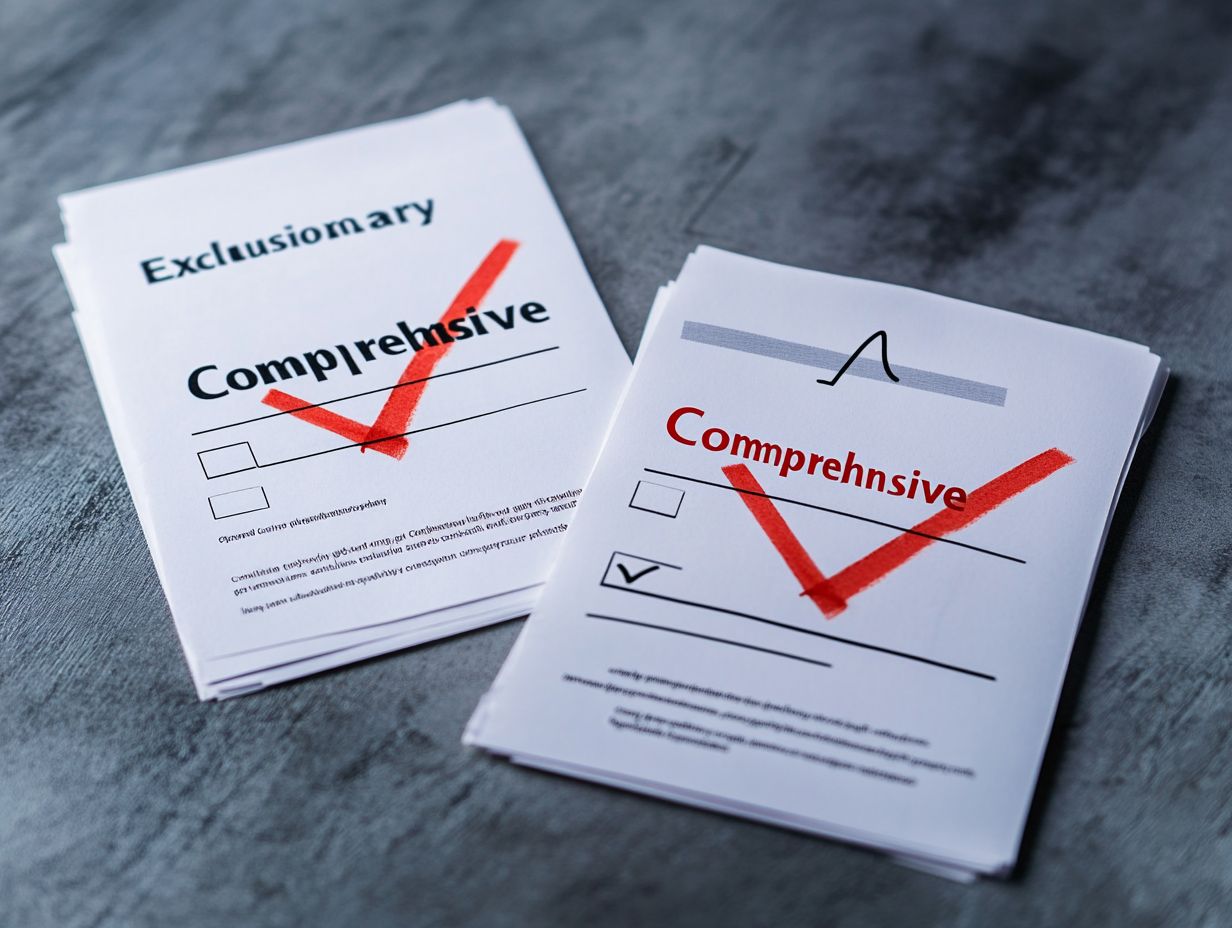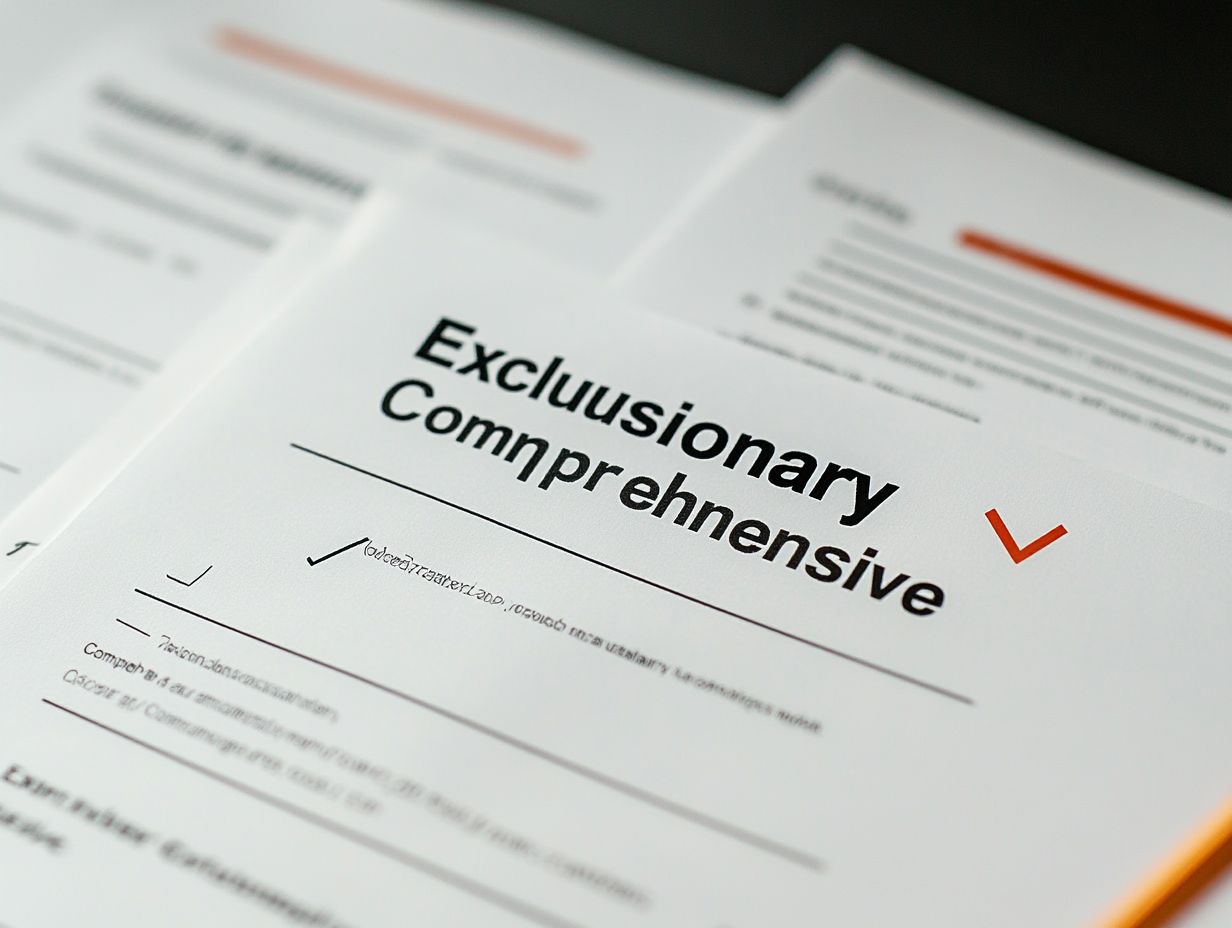What is an Exclusionary vs. Comprehensive Warranty?
Warranties are vital for protecting your investments. However, understanding the different types can seem overwhelming.
This article simplifies the essentials of warranties, focusing on two primary categories: exclusionary and comprehensive. You ll discover their unique coverage, limitations, and costs, helping you decide which option best meets your needs.
You ll also find tips to maximize your warranty benefits, ensuring you get the most value from your purchase.
Ready to understand the world of warranties with confidence? Keep reading!
Contents
Key Takeaways:

- Exclusionary warranties offer limited coverage and may have more restrictions, while comprehensive warranties provide more extensive coverage and flexibility.
- When choosing a warranty, consider your budget and specific needs to determine which type is the best fit for you.
- To make the most of your warranty, understand its terms and conditions, regularly maintain your product, and keep records of any repairs or replacements.
Understanding Warranties
Getting to know warranties can really empower you as you explore vehicle protection plans, providing peace of mind against unexpected repair costs. Warranties cover a variety of components and services, ensuring you don t have to shoulder the financial burden of necessary repairs especially in a world where auto expenses can suddenly spike.
This guide will explore the different types of warranties available and show how they can help you maintain your vehicle with confidence and ease.
What is a Warranty?
A warranty is a promise from the manufacturer or seller to repair or replace a product if needed within a specified timeframe. This assurance gives you peace of mind about the quality and reliability of your purchase.
Typically, warranties cover defects in materials and workmanship, but they may not cover damage from misuse or normal wear and tear. If a product fails to meet the warranty terms, you might face some legal implications, possibly leading to repairs, replacements, or even refunds.
It s important to understand the difference between warranties and service contracts. While warranties cover defects, service contracts extend to maintenance and repairs beyond normal usage and usually require a separate purchase. For example, vehicle service contracts can shield you from unexpected repair costs, making it crucial to grasp these distinctions for savvy purchasing decisions.
Types of Warranties
When considering vehicle protection, understanding the different warranties available can significantly influence your choices.
An exclusionary warranty generally covers everything except for specific exclusions, while a comprehensive warranty provides a wider range of covered repairs with minimal restrictions. By carefully evaluating these options, you can make informed decisions that suit your specific needs and budget.
Exclusionary Warranty
An exclusionary warranty is a specific type of warranty that covers a broad range of components while explicitly excluding certain parts or repairs not included in the agreement.
This warranty is often praised for its extensive coverage, typically including major vehicle components like the engine, transmission, and electrical systems. It s essential to pay attention to the exclusions, which usually encompass items prone to wear and tear, such as brake pads, batteries, and tires. By understanding what isn t covered, you can better evaluate your potential exposure to unexpected repair costs.
The primary advantage of this warranty is the peace of mind it provides, allowing you to enjoy your vehicle without the constant worry of costly breakdowns, especially concerning critical systems like powertrain coverage. Ultimately, choosing an exclusionary warranty is a smart move to protect your investment and enhance your driving experience.
Comprehensive Warranty

A comprehensive warranty provides extensive coverage for vehicle repairs and replacements, offering you better protection and peace of mind compared to limited options.
This type of warranty covers a wide array of components, including the engine, transmission, and electrical systems. It ensures that unexpected expenses are kept to a minimum.
Consumer surveys consistently reveal that individuals who choose these comprehensive plans often report greater satisfaction because they can rest easy knowing they won t face significant out-of-pocket costs. These warranties often include benefits such as roadside assistance and rental car reimbursement, enhancing your overall ownership experience.
Ultimately, investing in a comprehensive warranty can foster a more enjoyable and worry-free relationship with your vehicle.
Differences Between Exclusionary and Comprehensive Warranties
Knowing the differences between exclusionary and comprehensive warranties is key to protecting your vehicle. Each type presents unique benefits and limitations that can influence both cost and availability.
While exclusionary warranties might catch your eye with a lower initial price, they come with more restricted coverage. On the other hand, comprehensive warranties, although typically pricier, provide wider protection across a range of components, enhancing your peace of mind.
Coverage and Limitations
The coverage and limitations of a warranty are vital considerations when selecting the ideal vehicle protection plan. These factors determine which repairs and replacements are included in your agreement.
Understanding the specifics of each warranty type be it bumper-to-bumper, powertrain, or extended warranties is essential. For example, a bumper-to-bumper warranty typically encompasses a wide range of components, including electrical systems, air conditioning, and fuel systems, but often excludes wear-and-tear items like brake pads and wiper blades.
A powertrain warranty focuses on the engine and parts that make it run, potentially overlooking several other critical systems. Familiarizing yourself with these nuances empowers you to make a decision that aligns perfectly with your driving habits and long-term needs.
Cost and Availability
The cost and availability of warranties can vary significantly depending on the warranty provider, the type of coverage you choose, and the specific vehicle in question. Act fast to secure the best warranty that meets your needs!
Different makes and models often come with unique warranty considerations. For example, a luxury vehicle may entail higher warranty costs compared to a more common model due to its specialized parts and repair expenses.
Various providers offer differing levels of protection and add-ons, which can influence both the price and the terms of the warranty. It’s crucial to assess these elements thoroughly; a comprehensive comparison can reveal significant savings and ensure adequate coverage tailored to your individual needs.
By taking the time to evaluate all available choices, you can make informed decisions that ultimately enhance your vehicle ownership experience.
Which Warranty is Right for You?
Selecting the appropriate warranty is a crucial decision that can significantly affect your financial well-being. It s essential to weigh various factors before finalizing your choice, particularly when considering options like an extended car warranty.
Key elements such as the age of your vehicle, anticipated repair costs, and your personal budget should all influence your decision. This ensures you choose a warranty that offers the best protection tailored to your specific needs.
Factors to Consider

When thinking about a warranty, consider your needs, lifestyle, and budget. These factors shape your decision.
The age of your vehicle matters too. Older cars need more coverage due to wear and tear.
Think about how long you plan to keep your vehicle. If it’s short-term, an extensive policy might not be worth it.
Evaluating your financial situation can help you see if a warranty upgrade fits comfortably within your budget. By weighing these elements, you can make informed choices that meet your unique needs and offer peace of mind.
How to Make the Most of Your Warranty
To truly maximize your warranty, it s essential to understand its terms and conditions. Take action to get the most coverage and benefits, especially for your vehicle protection.
By knowing the specifics of your warranty and how to use it effectively, you can avoid unexpected costs and enjoy peace of mind during necessary repairs.
Tips for Maximizing Coverage
To ensure you get the most out of your warranty, follow maintenance guidelines and keep detailed records of all repairs and services.
Regular maintenance tasks, like oil changes and tire rotations, are crucial for extending your vehicle’s lifespan and maintaining your warranty’s validity. Be sure to check your owner’s manual for the best service intervals!
Address any issues immediately whether it’s an unusual noise or a warning light. Delays can lead to complications that might jeopardize your warranty.
Keep detailed records of all maintenance activities, including receipts and service provider details. This acts as proof of compliance and can be invaluable if you need to make a warranty claim.
Frequently Asked Questions
What is an Exclusionary Warranty?
An exclusionary warranty, sometimes called a named component warranty, only covers specific parts of a product. Any parts not explicitly listed will not be covered if something goes wrong.
What is a Comprehensive Warranty?

A comprehensive warranty, also known as a bumper-to-bumper warranty, covers all parts of a product. This type offers more thorough protection and peace of mind for consumers.
What are the benefits of an Exclusionary Warranty?
An exclusionary warranty can often be less expensive since it only covers specific parts. It allows for customization, letting you choose what components you want covered. Plus, it’s easier to understand, with a clear list of what’s included.
What are the benefits of a Comprehensive Warranty?
A comprehensive warranty provides broader protection by covering all parts. This can save you from unexpected and costly repairs. It also simplifies the process, as you won’t have to worry about what’s included; everything is covered.
Which type of warranty is better?
This depends on your personal preferences and needs. An exclusionary warranty might suit those on a budget or who prefer more control over coverage. A comprehensive warranty could be best for those wanting thorough protection without worrying about excluded parts.
Can a Comprehensive Warranty be converted to a warranty that excludes certain coverage?
Wondering if you can switch your warranty type? In most cases, you cannot convert a Comprehensive Warranty to a warranty that excludes certain coverage.
The manufacturer usually decides the type of warranty, and it cannot be altered. Choosing the right warranty is crucial. Always review the terms and conditions before making a decision.




